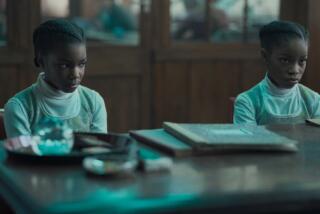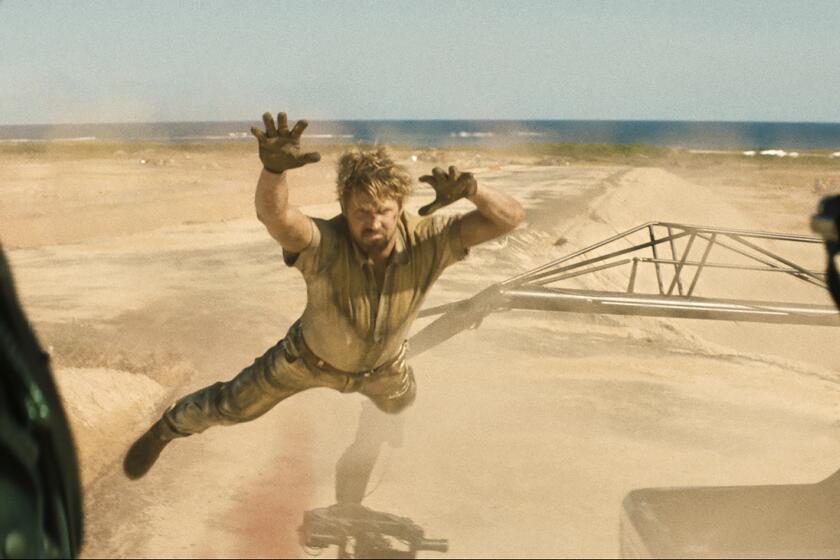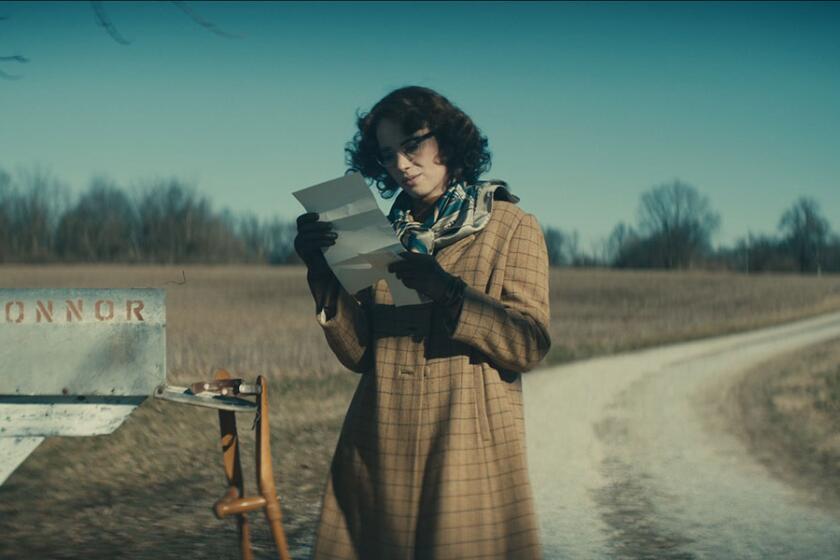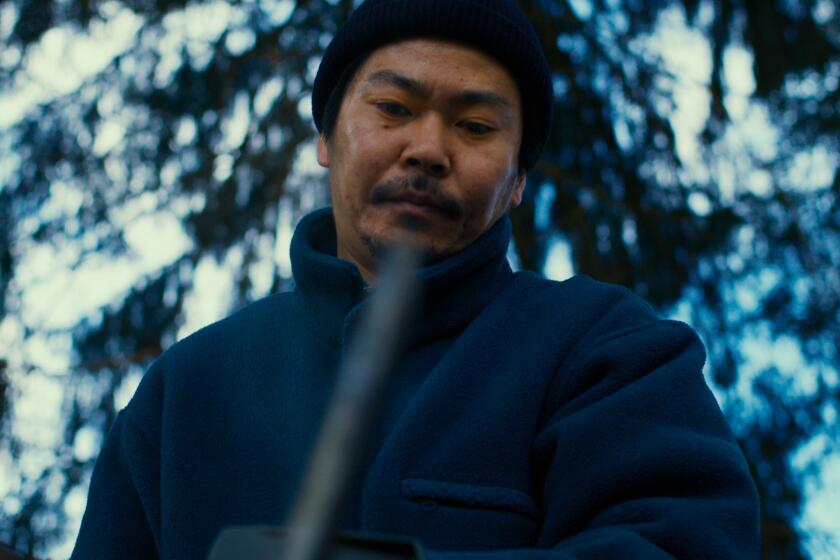Too much realism on location in Iraq
MOHAMED DARADJI knelt in the dust at the sheik’s feet, begging for his life and the lives of his companions. The gunmen, who had grabbed them in midscene off a Baghdad street, were Sunni Muslims, loyalists to Saddam Hussein’s fallen regime. So Daradji, a Shiite, fervently swore he was a fellow Sunni, a Baath Party member, anything to make the beatings stop.
It didn’t work.
“Take them,” the elder leader said as the gunmen hustled the director and his three film crew members -- two of them his young nephews -- into a pickup truck. The last thing Daradji remembers is hearing the sounds of the Tigris River nearby and knowing he was about to be executed.
“I felt the angel of death coming,” said Daradji, 28.
Then he blacked out.
Every movie ever made carries with it a tale of hardship and difficulty: budget problems, creative battles, equipment failures. But “Ahlaam,” Daradji’s first feature, may just trump them all. Filmed in post-invasion Baghdad with antiquated equipment and an untrained crew amid collapsing security, the movie is a testament to Daradji’s resourcefulness, stubborn dedication and, to an extent, sheer dumb luck.
Despite his hopes, the film, which he says has been hamstrung by the lack of a promotional budget from Iraq’s erstwhile Ministry of Culture, didn’t make the Oscar short list for best foreign language film. Still searching for a distribution deal, Daradji has been on the film festival circuit from Brooklyn to Cairo. It was well received at the Santa Barbara International Film Festival last weekend and will be screened at the Portland International Film Festival this month and the Tiburon International Film Festival next month.
Daradji’s film may end up being the last movie to come out of Iraq for a while. The country’s artistic life experienced a brief resurgence in the year after the U.S.-led invasion, with musicians, painters and actors all striving to restore Baghdad’s legacy as one of the Arab world’s cultural capitals. That trend has died as Iraq descends into civil war, with much of the educated, artistic class fleeing the country.
“Ahlaam,” set largely in a Baghdad mental hospital during the U.S. siege of the capital, tells the tragic story of modern Iraq through the experiences of three protagonists -- two of whom spend most of the film nearly catatonic. The film is unrelentingly dark -- both in tone and in actual lighting. Some of the scenes are so murky that it’s hard to tell what’s happening; between unreliable equipment and constant power cuts, Daradji said he sometimes had to shoot using car headlights rigged with filters.
The arbitrary cruelty of Hussein’s regime is vividly on display in the lives of all the main characters: The title character, Ahlaam, is driven mad when her activist fiance is arrested on their wedding day; Ali, a former soldier, is mutilated and forcibly committed for deserting the army; Dr. Mehdi, the asylum’s new staffer, is blackballed to the fringes of medicine because of his father’s activist past. And the U.S. soldiers who appear at the close of the film come off as one more disaster rather than anybody’s saviors. The ending, with Baghdad overrun by American troops, leaves little hope that things will get better.
It was in this shattered and increasingly lawless landscape that Daradji first conceived “Ahlaam.” A Baghdad native, he left Iraq in 1995 at age 17, acquiring Dutch citizenship and a master’s in film production from Leeds Metropolitan University in England.
He returned to Iraq in autumn 2003, several months after the U.S.-led ousting of Hussein.
“It was chaos,” he said. “I found mental patients wandering in the street.”
He and a friend helped deliver an escaped patient back to Baghdad’s main asylum, and Daradji stayed on as a volunteer. “I spent two weeks going there every day, bringing clothes and cigarettes for the patients,” said Daradji. Now a resident of Leeds, England, he is an excitable man, with a cascade of curly black hair and an ever-present cigarette. He speaks with hand-waving passion about the conditions in Iraq and his desire to keep filming in the country where much of his family still lives.
His main characters -- the delusional former bride, the shellshocked soldier and the idealistic doctor -- are all based directly on people he met during that time.
With the idea in place, Daradji faced the daunting logistics of bringing “Ahlaam” to fruition. For starters, while the Iraqi entertainment industry had steadily produced television shows for state-controlled channels, the country had not produced a movie in decades. All 35-millimeter film stock had been banned under international sanctions as a “dual use” item that could be used to help make chemical weapons.
Functioning equipment was almost impossible to find, as were experienced crew members, and Daradji drafted his nephews and cousins into the effort. Seeking “natural performances,” he deliberately chose less experienced theater students and amateurs. The actor who plays Ali, Bashir Majid, was an Iraqi journalist cast on the spot after he interviewed Daradji.
Casting the title character proved the most difficult. A scene in which a disoriented Ahlaam is raped scared away most of the actresses who auditioned. Aseel Adil, the actress who took the part, agreed to do so only if her husband could play the rapist.
Under suspicion, under fire
DARADJI began filming in mid-2004, accompanied by a police escort, coordinating with the Dutch embassy and telling everyone they were “student filmmakers making a short love story.” Still, the filmmaker says, they were shot at more than once by passing U.S. patrols while filming after curfew on the Baghdad streets. When filming outdoor flashbacks of Ali’s military days, Daradji lived in fear that his sets would be mistaken for some sort of insurgent training camp by an American helicopter crew.
“Whenever the helicopters would approach, we would hold our breath,” he said.
He created a bedsheet-sized sign on the ground reading: “Please Mr. Pilot. I’m an Iraqi filmmaker rebuilding Iraq. Do not shoot at me. Contact your army base.” Despite the precautions, the shoot was cut short after the Dutch Embassy advised Daradji he could no longer work safely in Iraq. The last straw: a chaotic 24-hour period in December 2004 when Daradji and several crew members achieved a sort of modern Iraq trifecta -- kidnapped and bullied by Sunni Muslim gunmen, then kidnapped again and bullied by Shiite Muslim gunmen, and finally jailed and interrogated by American soldiers.
The Sunni militiamen arrived in several cars while Daradji was shooting scenes on Baghdad’s notoriously dangerous Haifa Street. A young nephew on the crew was shot in the leg during the kidnapping. Daradji still isn’t sure why they didn’t kill him by the riverside and speculates that his captors fled after hearing a police siren.
While he and his crew were being treated, a new group of gunmen burst into the hospital emergency room. They turned out to be Shiite gunmen who had heard of the incident and believed Daradji was a spy, he says. After more beatings and begging, the gunmen delivered them to the nearest American base.
“I was so happy I felt like I was being born again,” Daradji said.
The Americans promptly threw hoods on the men’s heads and jailed them. During interrogation, Daradji says, an American officer threatened to send him to Abu Ghraib and told him, “You work for Al Qaeda. You’re making a propaganda film.” The group was eventually transported to a jail cell inside Baghdad’s Green Zone, where they spent four days while the Dutch Embassy negotiated their release. “The last three days were actually really funny,” said Daradji, who befriended his American guards and helped them translate jokes back and forth with Iraqi prisoners.
With the Dutch urging him to flee the country, Daradji scrambled through three final days of shooting. “I had to cut a lot of scenes,” he said.
Since completing the film, he’s spent the last year steadily promoting it around the world. Majid received the best male actor award at the 2006 Brooklyn International Film Festival.
Daradji says he’s been particularly gratified by the American response and the appetite among U.S. audiences for information that humanizes the sometimes incomprehensibly tragic Iraqi reality.
“Americans really want to know what’s happening there,” he said. “You hear it on the news -- people killed and kidnapped and tortured. But it’s just numbers.”
*
Borzou Daragahi in Baghdad contributed to this report.
More to Read
Only good movies
Get the Indie Focus newsletter, Mark Olsen's weekly guide to the world of cinema.
You may occasionally receive promotional content from the Los Angeles Times.






